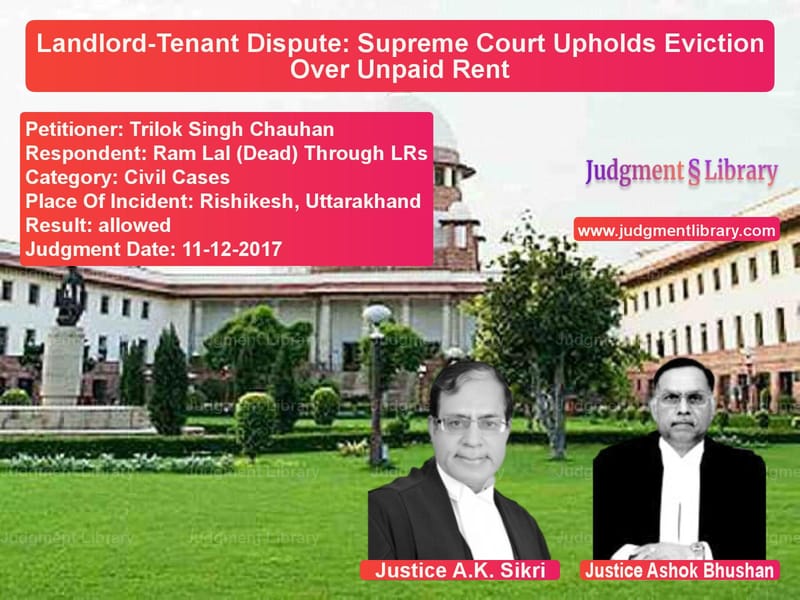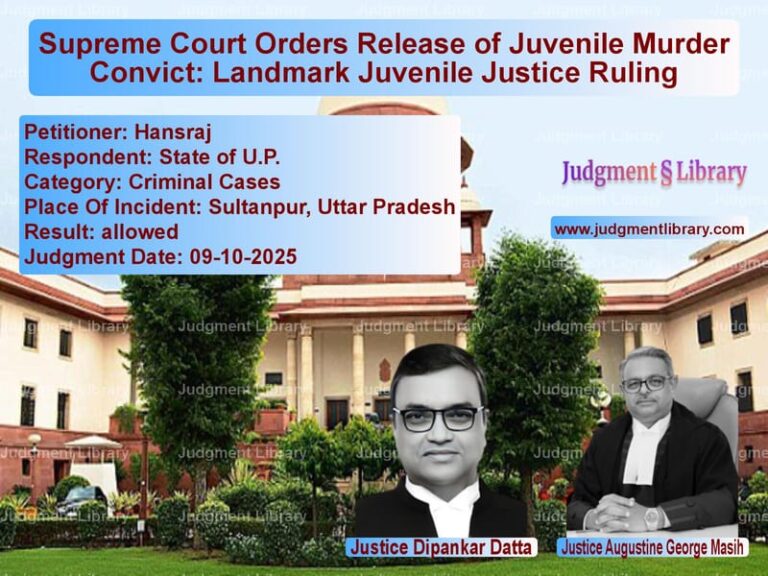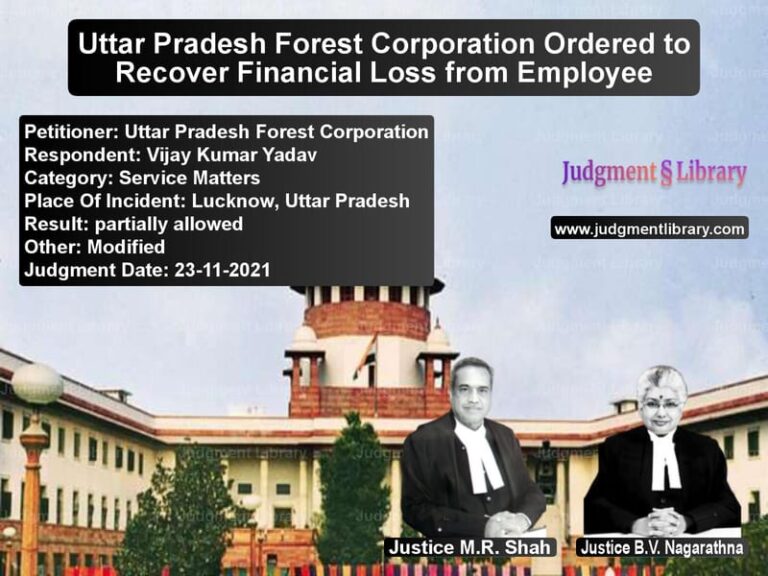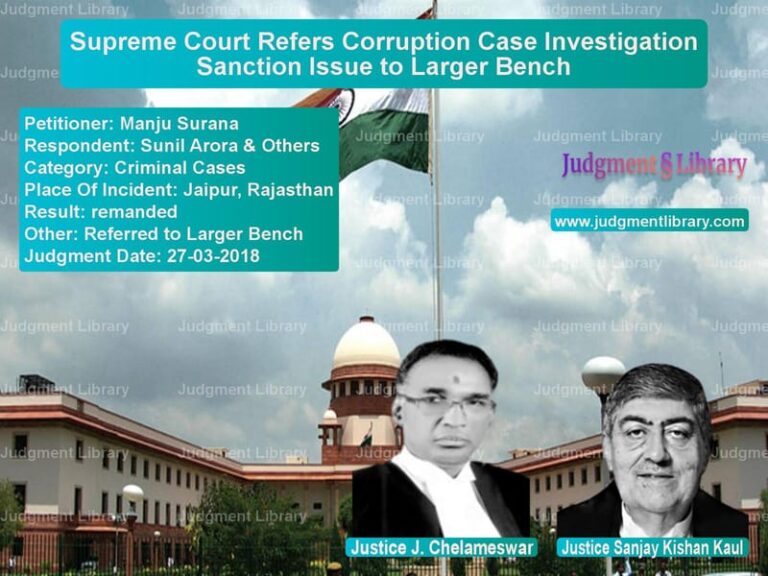Landlord-Tenant Dispute: Supreme Court Upholds Eviction Over Unpaid Rent
The Supreme Court of India recently delivered a judgment in Trilok Singh Chauhan vs. Ram Lal (Dead) Through LRs, addressing a long-standing dispute over non-payment of rent and eviction. The case revolved around a rented shop in Rishikesh, Uttarakhand, where the tenant had allegedly defaulted on rent payments for several years. The Supreme Court reinstated the eviction order issued by the Small Causes Court, setting aside the Uttarakhand High Court’s decision.
Background of the Case
The appellant, Trilok Singh Chauhan, owned a shop (No. 46) in Adarsh Gram Chauhan Market, Yatra Bus Station, Rishikesh. The respondent-tenant was running a clothing business in the shop. The dispute began when the landlord issued a notice on September 7, 2001, claiming that the tenant had failed to pay rent since December 2000.
The notice demanded:
- Outstanding rent at Rs. 1500 per month
- Payment within one month
- Daily damages of Rs. 50 per day for non-compliance
When the tenant did not respond, the landlord filed a suit before the Additional District Judge, Rishikesh, under the Small Causes Court Act, seeking eviction and rent recovery.
Legal Proceedings
Tenant’s Defense
- The rent was only Rs. 250 per month, not Rs. 1500.
- He had already paid rent up to August 2001 but was denied a receipt.
- From September 2001 to January 2002, he had attempted to pay rent via money order, but it was refused.
- The premises were protected under the U.P. Urban Buildings (Regulation of Letting, Rent, and Eviction) Act, 1972, which prevented eviction without cause.
Trial Court’s Findings
On May 13, 2004, the trial court ruled in favor of the landlord, finding that:
- The agreed rent was Rs. 1500 per month.
- The tenant had defaulted on rent payments.
- The money order sent by the tenant was insufficient and thus refused.
- The premises were not protected under the rent control act.
The trial court issued an eviction order and directed the tenant to pay outstanding rent and damages at Rs. 50 per day.
High Court’s Decision
The tenant challenged the ruling before the Uttarakhand High Court under Section 25 of the Provincial Small Cause Courts Act, 1887. On August 26, 2014, the High Court:
- Set aside the trial court’s eviction order.
- Ruled that the rent was Rs. 250 per month, not Rs. 1500.
- Criticized the landlord for seeking possession through inflated rent claims.
Supreme Court’s Observations
A bench comprising Justices A.K. Sikri and Ashok Bhushan overturned the High Court’s ruling.
On the Validity of the Rent Amount:
“The landlord provided documentary evidence, including an evaluation list from the municipal authority, proving that the rent was Rs. 1500 per month. The tenant failed to provide any documentary proof to support his claim of Rs. 250 per month.”
On the High Court’s Interference:
“The High Court’s finding was based purely on assumptions. It failed to consider key evidence provided by the landlord and ignored the trial court’s detailed reasoning.”
On the Tenant’s Money Order Defense:
“The tenant deliberately attempted to pay a lower amount than required. The landlord was justified in refusing incomplete payment.”
On Section 25 of the Small Cause Courts Act:
“The High Court had limited jurisdiction under Section 25. It could not reassess the evidence as if hearing a regular appeal.”
Final Judgment
The Supreme Court:
- Set aside the High Court’s judgment.
- Reinstated the trial court’s order for eviction.
- Directed the tenant to vacate the premises.
- Ordered the tenant to clear outstanding rent and pay damages at Rs. 50 per day.
Impact of the Judgment
For Landlords
- The ruling strengthens the rights of landlords to claim unpaid rent and evict defaulting tenants.
- Documentary evidence, such as municipal rent evaluations, plays a crucial role in rent disputes.
For Tenants
- Failure to pay rent on time can lead to eviction.
- Tenants must provide documentary proof to support their claims regarding rent amounts.
For Courts
- High Courts must avoid re-evaluating evidence when hearing revisions under Section 25.
- Judicial interference should be limited to correcting legal errors rather than reassessing factual findings.
Key Takeaways
- The Supreme Court upheld eviction for non-payment of rent, reinforcing landlord rights.
- Documentary evidence is crucial in resolving rent disputes.
- The ruling limits the High Court’s power to interfere in factual findings made by trial courts.
This landmark judgment provides clarity on landlord-tenant disputes, ensuring a fair balance between the rights of both parties.
Don’t miss out on the full details! Download the complete judgment in PDF format below and gain valuable insights instantly!
Download Judgment: Trilok Singh Chauhan vs Ram Lal (Dead) Throu Supreme Court of India Judgment Dated 11-12-2017.pdf
Direct Downlaod Judgment: Direct downlaod this Judgment
See all petitions in Landlord-Tenant Disputes
See all petitions in Property Disputes
See all petitions in Damages and Compensation
See all petitions in Judgment by A.K. Sikri
See all petitions in Judgment by Ashok Bhushan
See all petitions in allowed
See all petitions in supreme court of India judgments December 2017
See all petitions in 2017 judgments
See all posts in Civil Cases Category
See all allowed petitions in Civil Cases Category
See all Dismissed petitions in Civil Cases Category
See all partially allowed petitions in Civil Cases Category







